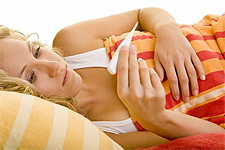Essential Oils That May Provide Support With Mild Cold and Flu Symptoms

Ever since I began my aromatherapy journey many years ago, I have experienced far less colds and flus than I previously had. And when I get ill, I seem to recover faster.
The use of essential oils may help to make recovery a little more pleasant (or should I say a little less unpleasant).
However, the use of essential oils is not a substitute for proper medical attention. Although some essential oils are considered antibacterial or antiviral, the use of essential oils should not be relied upon to prevent you from getting sick. Essential oils should not be used as a substitute for properly tested disinfecting products that are proven and approved for use in killing certain bacteria and viruses. If you are sick, consult with your medical practitioner or a qualified aromatherapist.
After you read this article, I recommend that you also read the article that I originally wrote when the H1N1 Virus was causing a lot of fear: Minimizing the Risk of Contracting the Flu.
Some Essential Oil Uses That May Ease Mild Cold and Flu Symptoms
If you are new to aromatherapy and the use of essential oils, read about Essential Oil Safety, and learn as much as you can about essential oils by reading through AromaWeb's Article Archive area. Essential oils should not be used as a substitute for proper medical attention and medications when needed. Essential oils should also not be relied upon as a way to stay completely illness free. There is no gurantee that any of these methods mentioned here will prevent you from getting sick.
Diffusion
When you are sick, diffusing essential oils that are expectorants and decongestants can be helpful.
Diffusion of essential oils, especially those that are antimicrobial may help to reduce the number of microbes in your household that can make you and your family sick. However, diffusion will not kill all microbes and it is not a substitute for using disinfecting products that have been formally tested for their efficacy.
Room Mists
Room mists are an option when you don't have the option to use a diffuser. Sprays that include expectorant oils can be supportive. However, room mists should not be depended upon for use as a disinfectant spray. They are not as effective as commercial sprays that have been formally tested.
To learn how to make your own room mists, view AromaWeb's Air Freshener/Room Mist Recipe.
Surface Sprays
Natural and nearly all-natural surface sprays made with essential oils can help to remove dirt and grease from the surfaces in your household. You can make them yourself inexpensively or purchase them ready made.
Handcrafted surface sprays, however, should not be relied upon for use as disinfectant sprays. They are not as effective as commercial products that have been formally tested to kill 99.9% of bacteria and viruses.
Be sure not to spray room mists or surface sprays where pets, furniture, open beverages, collectibles or other objects can become damaged or harmed by the mist.
Inhalers
Personal inhalers are about the size of a tube of lip balm and allow you to conveniently inhale your chosen essential oils anytime that you wish. Aromatherapy vendors sell them pre-filled with essential oils that can support general and respiratory wellness, or you can buy the mechanisms to make your own.
Chest Rubs
Chest rubs containing decongestant essential oils can be purchased from aromatherapy retailers or you can make them yourself to keep on hand if you become sick. An especially luxurious chest rub could even be made by using AromaWeb's Whipped Shea Butter recipe as the base.
An Important Note About Hand Sanitizers and Gels
The CDC recommends hand sanitizers with a minimum 60% alcohol concentration. Many of the natural hand gel and oil recipes that can be found online not meet these guidelines. Beware that handcrafted gels are not usually as effective as commercial products that have been tested for their ability to kill viruses and bacteria. For more information, read The Dirty Truth About DIY Hand Sanitizer Recipes by professional cosmetic formulator Kayla Fioravanti.
Pneumonia and Bronchitis
Essential oils that offer expectorant and decongestant properties may help soothe the symptoms of bronchitis and pneumonia. However, remember that aromatherapy and the use of essential oils is not a substitute for seeking proper medical treatment as necessary.
Essential Oils That May Be Helpful for Colds
Sources: Valerie Ann Worwood, The Complete Book of Essential Oils and Aromatherapy, 25th Anniversary Edition (Novato, CA: New World Library, 2016. Neryls Purchon and Lora Cantele, Complete Aromatherapy & Essential Oils Handbook for Everyday Wellness (Toronto ON: Robert Rose, 2014). Julia Lawless, The Encyclopedia of Essential Oils (Updated Edition) (London: Harper Thorsons, 2014).
Before choosing to use any essential oil, read about Essential Oil Safety, and be sure that you learn the safety information and contraindications that apply to the oil(s) you are considering. Aromatherapy is not a substitute for proper medical care and cannot replace your doctor/medical professional/medications when needed.